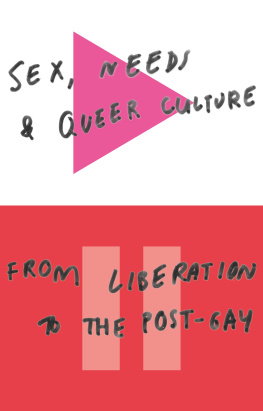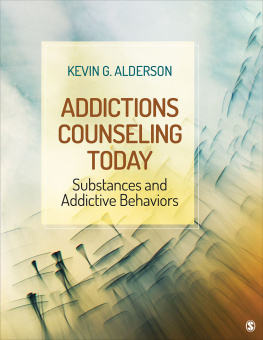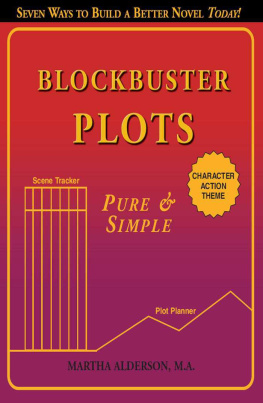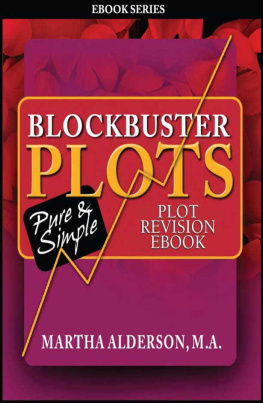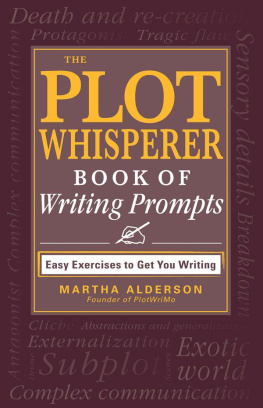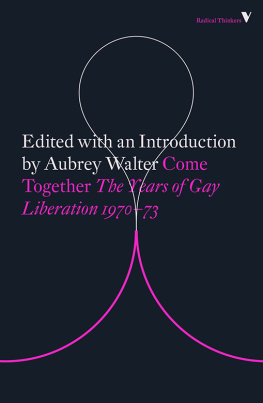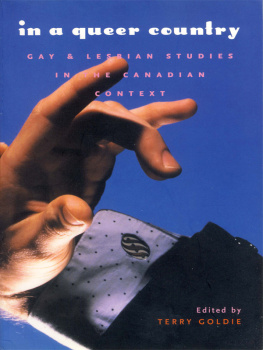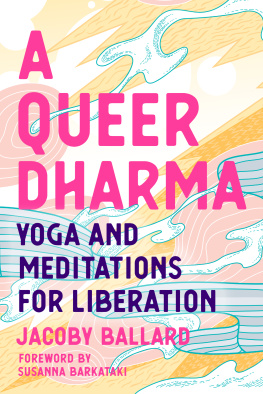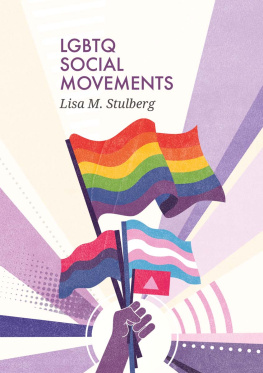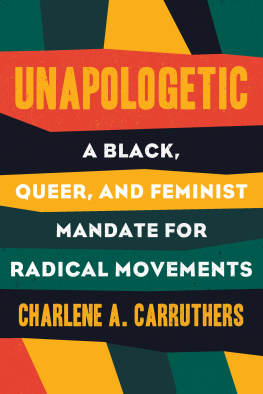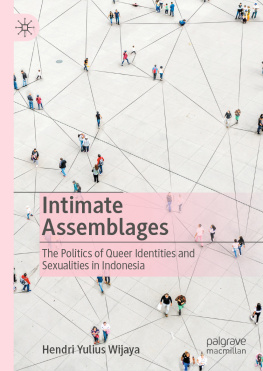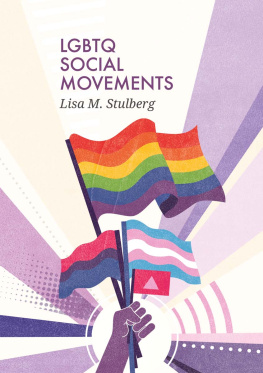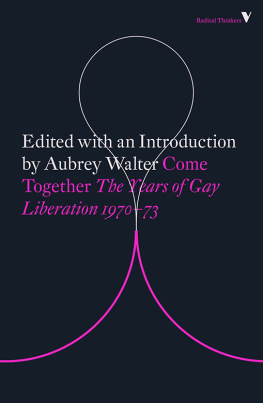Sex, Needs and Queer Culture
About the Author
David Alderson is senior lecturer in modern literature at the University of Manchester and visiting professor at Shanghai Jiao Tong University. He is co-organizer, with Laura Doan, of the Centre for the Study of Sexuality and Culture at Manchester.
Sex, Needs and Queer Culture
From liberation to the postgay
DAVID ALDERSON
Sex, Needs and Queer Culture: From liberation to the postgay was first published in 2016 by Zed Books Ltd, The Foundry, Oval Way, London SE RR, UK.
www.zedbooks.co.uk
Copyright David Alderson 2016
The right of David Alderson to be identified as the author of this work has been asserted by him in accordance with the Copyright, Designs and Patents Act, 1988 .
Typeset in Scala by Swales & Willis Ltd, Exeter, Devon
Index: Ed Emery
Cover design: Michael Oswell
All rights reserved. No part of this publication may be reproduced, stored in a retrieval system or transmitted in any form or by any means, electronic, mechanical, photocopying or otherwise, without the prior permission of Zed Books Ltd.
A catalogue record for this book is available from the British Library.
ISBN -- 78360 -- hb
ISBN -- 78360 -- pb
ISBN -- 78360 -- pdf
ISBN -- 78360 -- epub
ISBN -- 78360 -- mobi
Contents
Writing a book inevitably renders one indebted to others, but in the best possible ways.
I am fortunate to work in the kind of department in which I can count all my colleagues as friends, but some deserve particular mention here. Laura Doan has been a collaborator for well over a decade now. No one could have been more encouraging and generously supportive than she has been at times when my own enthusiasm for this project (and others) was at a low ebb. Jackie Stacey, too, has provided moral support, but has also been resourceful and imaginative in creating spaces for the kinds of intellectual exchange that have both allowed me to try out ideas and challenged me to think afresh. Howard Booth has often reassuringly confirmed my prejudices because his is a judgement I trust (his taste for Kipling and Busoni notwithstanding). Jeremy Tambling has been an irrepressible, but sociable, spur to thought and hard work. Patricia Duncker always raises spirits and offers sound advice.
Beyond the ranks of my Manchester colleagues, I have benefited from numerous conversations with David Halperin on matters related to this book in the different parts of the world we have found ourselves in. Weekends at Benita Parrys house have been an inspiring mixture of uncompromising talk, proper fun and good whisky.
I have discussed the issues explored in this book with David Wilkinson over the years so extensively that it seems fair to say that we have evolved a shared perspective on them. He has also generously offered feedback on more extensive portions of the book than anyone else, and often at short notice. Others who have read earlier drafts of individual chapters and offered valuable suggestions include Iain Bailey, Daniela Caselli, Doug Field, Ben Harker, Graham MacPhee, Stephen Maddison, Benita Parry, Eithne Quinn, Robert Spencer and Jeremy Tambling. Of course, I am solely responsible for the books shortcomings.
In recent years, I have spent a lot of time in China as a visiting professor at Shanghai Jiao Tong University. In various ways, this has enabled me to focus on this and related projects, but it has also been a fascinating and enjoyable experience. I am thankful to Wang Jie for the invitation, for his remarkable energy in organizing seminars and conferences, and for his splendid hospitality. I am also grateful to my friends in Shanghai, Wang Bin, Chen Jing, Ningjia Zhu and Yin Qinghong, for making my trips there so convivial.
Colleagues in the Raymond Williams Society of Japan invited me to give a version of chapter two of this book as a lecture in Tokyo in 2015 . The incisive response from Shintaro Kono and wonderful discussion that followed made this a memorable event for me. I am grateful not only to Shintaro, but also to Fuhito Endo, Masashi Hoshino, Yasuo Kawabata, Asako Nakai and Ryota Nishi for organizing it, and for their thoughtfulness and hospitality.
Lengthy visits to China have made my trips to Spain sadly much rarer in recent years, and I very much regret the consequent loss of contact with friends and collaborators at the Universitt Autnoma de Barcelona namely Sara Martn Alegre, Meri Torras and Diego Falconi Travez that I enjoyed in the early stages of writing the book. I hope to return soon now that it is finished.
In a more general sense, the Didsbury Discussion Group has kept me informed and on my toes for a long time. In ways they may not be aware of, its hosts, Pat Devine and Elena Lieven, have helped consolidate the political instincts and sensibilities that are evident in the book, as have the annual fellow pilgrims to Hellsgarth.
Jessie, Ian and Heather Alderson have tolerated my absences and anxieties in recent years, and each remains an inspiration to me.
I am delighted that this book is being published by the Zed Books collective. Kim Walker has been an enthusiastic and patient editor. What better qualities could an author hope for?
More formally, I would like to thank the editors of new formations , Theoretical Studies in Literature and Art and Textual Practice for allowing me to reproduce here material published in those journals in different forms.
The book is dedicated to someone whose example and wisdom impress me more as the years go by: Alan Sinfield.
I began work on the project that has turned into this book many years ago. It was then envisaged as a work on postgay culture. That was not my term, but rather one that had been advanced by others with quite diverse, even opposing, purposes. On the one hand, it was used to highlight the potential for assimilation that now exists (rendering a supposedly strident gay identity and politics obsolete); on the other, it was associated with a perspective that viewed gay as the very sign of assimilation, and demanded new forms of radicalism in its place. In other words, the term seemed instructively contradictory, and I was more interested in those contradictions and what they might produce than in any homogeneous shift supposed to be taking place. The current book retains some of that earlier impulse, but has become a more expansive set of reflections on culture, theory and political economy of the period since the 1960 s in their relations with the category of sexuality.
At a certain point in thinking about the book, then, I decided to resist the normally very good advice that one should maintain a precise focus, and instead followed my intuitions in allowing it to become the project it seemed to be straining towards. If the postgay related in some sense to assimilation and its discontents, what kind of order was it that people were now able to assimilate to, and how had this become possible? How had the system changed, and what did it demand of us; or, to put that in other words, what reality principle now obtained? How had systemic change impacted on the politics of sexuality, and to what extent were they still governed by received wisdoms? Why might resistance still be desirable given what was now possible, and what might it entail? What were the implications of assimilation for the category of subculture? But how, in any case, did we understand that latter category and both its limitations and potential?
The processes that guided me towards these kinds of question were neither mystical, nor governed by abstract logic. Intuitions are always conditioned, not only by the convictions of various sorts we have already arrived at, but also by our socio-cultural positioning. That is one way of saying that there is something personal about this book, not in the sense that it emerged out of merely private or idiosyncratic concerns, but that its preoccupations were determined by a particular experience of and disposition towards the historical and theoretical developments of the very decades it treats.
Next page
